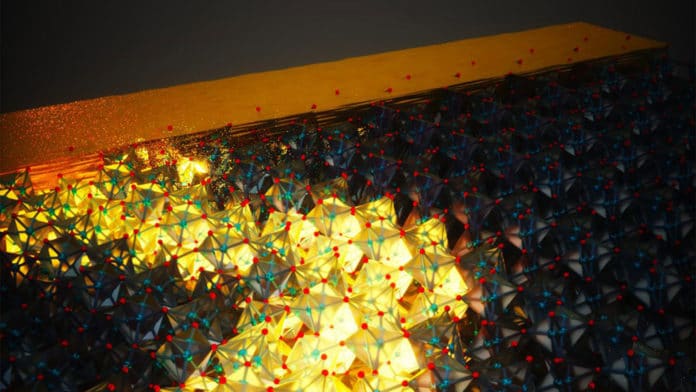EPFL researchers have discovered a compound that can remember the entire history of previous external stimuli. Vanadium Dioxide (VO2) has an insulating phase when relaxed at room temperature and undergoes a steep insulator-to-metal transition at 68 °C, where its lattice structure changes.
Classically, VO2 has a volatile memory: The material returns to the insulating condition immediately when the excitation is removed. Scientists sought to learn how long it takes for VO2 to change states. After doing many measurements, they discovered a memory effect in the material’s structure, which changed the course of their research.’
Scientists applied an electric current to a sample of VO2.
Mohammad Samizadeh Nikoo, a Ph.D. student at EPFL‘s Power and Wide-band-gap Electronics Research Laboratory (PowerLab), said, “The current moved across the material, following a path until it exited on the other side. The current heated up the sample and caused the VO2 to change state. And once the current had passed, the material returned to its initial state.”
Scientists then applied a second current pulse to the material and saw that the time it took to change state was directly linked to the history of the material.
Prof. Elison Mattioli, who heads the PowerLab, said, “The VO2 seemed to ‘remember’ the first phase transition and anticipate the next. We didn’t expect to see this kind of memory effect, and it has nothing to do with electronic states but rather with the material’s physical structure. It’s a novel discovery: no other material behaves this way.”
“We found that VO2 can remember its most recent external stimulus for up to three hours. The memory effect could persist for several days, but we don’t currently have the instruments needed to measure that.”
This is a significant discovery as the memory effect they observed is an intrinsic property of the material itself. Engineers use memory to perform various calculations, and there is a considerable need for materials that could improve computation performance by providing more capacity, speed, and compactness. All three of these criteria are met by VO2. Furthermore, it differs from traditional materials that store data as binary information dependent on modifying electrical states due to its persistent, structural memory.
To reach their conclusions, the scientists used a variety of measurements. By using the novel method on various materials at other facilities worldwide, they could confirm their findings. VO2 switches behave exactly like neurons in this discovery, perfectly mimicking what occurs in the brain.
Journal Reference:
- M. Samizadeh Nikoo, R. Soleimanzadeh, A. Krammer, G. Migliato Marega, Y. Park, J. Son, A. Schueler, A. Kis, P. Moll, and E. Mattioli, “Electrical Control of Glass-like Dynamics in Vanadium Dioxide for Data Storage and Processing,” Nature Electronics, 2022. DOI: 10.1038/s41928-022-00812-z
